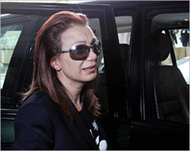UN team may return to Lebanon
The United Nations is to consider sending a verification team back to Lebanon after reports that Syrian intelligence may not have completely withdrawn from the country, Secretary-General Kofi Annan said.

“We are now receiving reports that there may be elements that are still there, and we are considering the possible return of the verification team to ascertain what is going on,” Annan told reporters on Thursday.
A UN verification mission to Lebanon had reported on 23 May that Syria had “fully” withdrawn troops from its neighbour, in compliance with UN resolution 1559 steered through the Security Council in September by France and the United States.
The mission said it had found no trace of the Syrian intelligence services but added that the clandestine nature of such agencies made it difficult to establish their complete withdrawal.
Message to Damascus
Annan said Terje Roed-Larsen, his special envoy charged with monitoring the implementation of resolution 1559, would deliver a message from the secretary-general when he meets Syrian President Bashar al-Assad in Damascus.
Roed-Larsen will “have discussions with (al-Assad) on developments on the ground and will report back to me next week,” Annan said.
Syria’s decision to pull all its forces out of Lebanon came after the 14 February murder of former Lebanese prime minister Rafiq al-Hariri, blamed by many on the then-Lebanese government and its political masters in Damascus.
Al-Hariri’s assassination, which sparked widespread protests that brought down the government in Lebanon in late February, prompted the United Nations to launch an international commission to investigate the killing.
Kassir investigation
Also on Thursday, the widow of prominent Lebanese journalist Samir Kassir, who was murdered on 2 June, said she is seeking a criminal investigation by authorities from France, where her husband also held nationality, complaining that the Lebanese inquiry has been incompetent.
 |
|
Gisele Khouri, Samir Kassir’s widow, |
“I have made a formal complaint in France because Samir had French nationality and to benefit from the competence of French justice,” said Gisele Khouri, a journalist with Al-Arabiya television.
Khoury took advantage of a French law allowing her to file a complaint against “person or persons unknown”.
US Federal Bureau of Investigation and French police experts arrived in Beirut at the Lebanese government’s request, after Kassir was killed on 2 June by a bomb placed in his car outside the couple’s Beirut home.
‘Flaws’ in investigation
Sources close to the investigation told AFP the French and American experts had described the initial investigation as one of “total incompetence” after detecting “major flaws”.
“I do not want to accuse anyone,” Khoury said, “but it is obvious that the methods of Lebanese investigators are archaic. The preliminary international inquest into Rafiq Hariri’s assassination underlined that, and the interior minister at the time, Suleiman Frangieh, acknowledged it.”
She added: “I do not want other failures resulting from the incompetence of the local authorities to jeopardize the course of the investigation and to prevent justice from being done.”
Crime scene
The sources close to the investigation said Lebanese investigators had been too quick to clear the crime scene. In particular, they were faulted for having removed the car too quickly, resulting in the bomb’s detonator not being recovered.
 |
|
Demonstrators in Paris observe a |
They were also criticised for not having performed an autopsy immediately, saying that made it more difficult to determine the type of explosive used and to trace infrared signals from the transmitter, also not found, that detonated the explosive.
An autopsy was conducted after the insistence of the family, in the presence of the French experts, six days after the crime.
An initial UN report into the Hariri murder, issued in late March, said “there was a distinct lack of commitment on the part of the Lebanese authorities to investigate the crime effectively.”
It also claimed there may have even been illegal manipulation of some evidence.